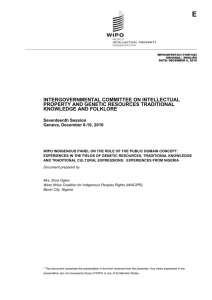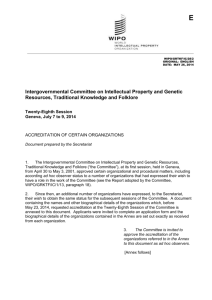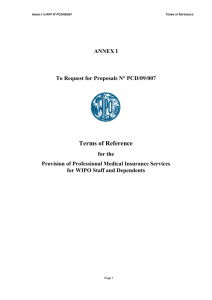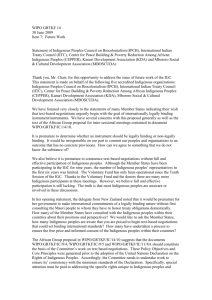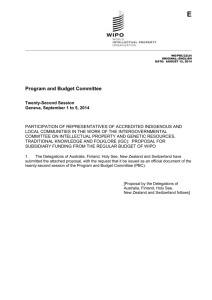Participation of Indigenous and Local Communities
advertisement
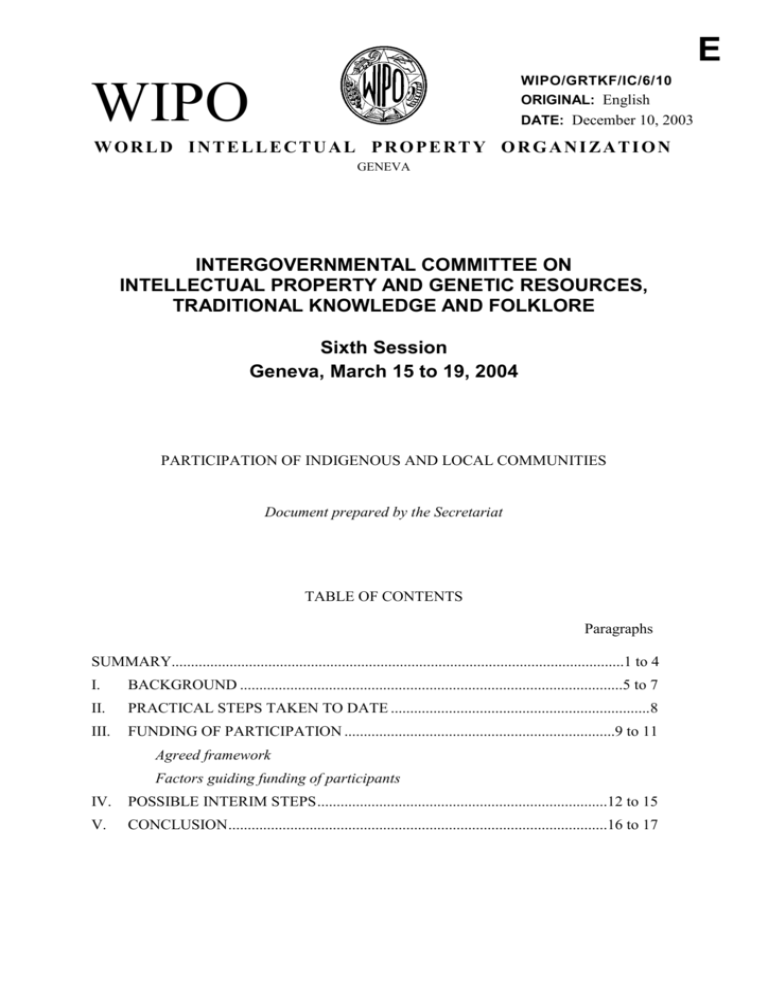
E WIPO/GRTKF/IC/6/10 WIPO ORIGINAL: English DATE: December 10, 2003 WORLD INTELLECTUAL PROPERTY ORGANIZATION GENEVA INTERGOVERNMENTAL COMMITTEE ON INTELLECTUAL PROPERTY AND GENETIC RESOURCES, TRADITIONAL KNOWLEDGE AND FOLKLORE Sixth Session Geneva, March 15 to 19, 2004 PARTICIPATION OF INDIGENOUS AND LOCAL COMMUNITIES Document prepared by the Secretariat TABLE OF CONTENTS Paragraphs SUMMARY.....................................................................................................................1 to 4 I. BACKGROUND ...................................................................................................5 to 7 II. PRACTICAL STEPS TAKEN TO DATE ...................................................................8 III. FUNDING OF PARTICIPATION ......................................................................9 to 11 Agreed framework Factors guiding funding of participants IV. POSSIBLE INTERIM STEPS ...........................................................................12 to 15 V. CONCLUSION ..................................................................................................16 to 17 WIPO/GRTKF/IC/6/10 page 2 SUMMARY 1. This document provides updated information on various steps under way to facilitate the participation of indigenous and local communities in the work of WIPO concerning intellectual property and genetic resources, traditional knowledge and traditional cultural expressions. It concentrates on enhanced involvement of these communities in the work of the Intergovernmental Committee on Intellectual Property and Genetic Resources, Traditional Knowledge and Folklore (‘the Committee’). It addresses the specific question of the possible provision of financial support for the participation of indigenous and local communities in sessions of the Committee, as a means to facilitate their involvement in WIPO’s work on these issues. 2. The WIPO General Assembly and the Committee itself have both emphasized the need for enhanced involvement of representatives of these communities. At its fifth session, the Committee discussed a set of proposals for enhanced involvement (document WIPO/GRTKF/IC/5/11), which itself was based on a survey of practices of other United Nations agencies and relevant intergovernmental organizations in facilitating the participation of non-governmental organizations (NGOs). The Committee agreed on a number of proposals, which have already been implemented in practice. The Committee also discussed further possibilities for the direct financing of participation of representatives of indigenous and local communities, with particular focus on the possibility of establishing a Voluntary Fund. 3. For practical reasons, immediate steps are preferred to further general debate, in light of the time-frame of the Committee’s work. Therefore, and as an interim and immediate step toward a possible more formalized approach in the future, the present document discusses the possibility of promoting an approach of facilitating informal NGO consultations, convened by NGO observers to the Committee, which would be held immediately prior to the Committee’s sessions but would have no formal linkage with the Committee. Existing or new voluntary funding initiatives, independent of WIPO, could focus on facilitating the participation of representatives of indigenous and local communities in the consultative forum and then extended to cover the participation in the Committee itself of those who are representatives of accredited ad hoc observers. 4. This would enable immediate improvements in the participation of such representatives in the work of the Committee and create a stronger consultative and informational basis for such representatives. It would also lay practical groundwork for the development of any more formalized approach to enhanced participation, such as the creation of a specific Voluntary Fund, which the Committee may need to consider further before any such formal structure can be fully implemented. WIPO/GRTKF/IC/6/10 page 3 I. BACKGROUND 5. Participants in the Committee have unanimously stressed the importance of the participation of NGOs in its work, and in particular the representatives of indigenous and local communities, and have called for this participation to be further enhanced and facilitated. Reflecting also the priority set in discussion and a decision of the WIPO General Assembly,1 the Committee, at its fourth session, concluded that:2 “(i) There was unanimous support for directly involving as much as possible representatives of indigenous and local communities in the work of the Intergovernmental Committee. (ii) A number of Delegations expressed support for WIPO directly financing a certain number of representatives of such communities. There was, however, no consensus in this issue and there was a strong need expressed to clarify the modalities in this context. (iii) As regards suitable mechanisms for facilitating the involvement of representatives of such communities, the Committee: - encouraged Member States to include such representatives in their national delegations; - endorsed and encouraged the other measures in this respect indicated in paragraph 13 of document WIPO/GRTKF/IC/4/12; and - requested the Secretariat to prepare by mid-April for the Committee’s fifth session, a report that outlines a range of options for facilitating a more formalized participation of indigenous and local communities, and indications of modalities on how these options could be implemented by the Committee. That report should include information on the practice of other United Nations and relevant intergovernmental organizations in facilitating the participation of nongovernmental organizations, including the modalities of selection, accreditation and application of funding, if applicable. On the basis of such information about practices in other organizations and on the basis of the Secretariat’s own independent analysis, the report should present a range of detailed possible options available to the Committee. These options should include: 1 2 - an analysis and update of the list of measures included in paragraph 13 of document WIPO/GRTKF/IC/4/12; - facilitating the participation of the United Nations Permanent Forum on Indigenous Issues in the future work on the issues dealt with by the Committee; The 37th Series of the Assemblies of the Member States of WIPO held from September 23 to October 1, 2002, document A/37/14, paragraphs 245 and 263 to 290. WIPO/GRTKF/IC/4/15, para. 60. WIPO/GRTKF/IC/6/10 page 4 - providing financial support for the participation of indigenous and local communities; and - a transparent mechanism to determine the number of participants, the process for selecting those eligible under some funding process, and the capacity in which they would participate. This report should form part of the basis for the general discussions which are expected to take place at the Committee’s fifth session on future work on the issues presently dealt with by the Committee.” 6. At its fifth session, the Committee considered the report it had commissioned (document WIPO/GRTKF/IC/5/11) and decided that: “There was an unanimous view that the participation of local and indigenous communities is of great importance for the work of the Committee and that all appropriate measures should be undertaken to facilitate that participation. It was considered that Member States should make every effort to include representatives of these communities in their national delegations. It was also considered that both WIPO and Member States should increase their efforts to implement the practical measures for enhancing participation as set out in paragraphs 10 and 11of the document under discussion. “Furthermore, the Secretariat should establish a web site for publishing submissions by NGO observers, particularly those representing local and indigenous communities, on issues relating to the issues under the discussion in the Committee. “As regards the source of the funding of participation of local and indigenous communities, there was no consensus in the Committee. Most delegations who spoke, however, favoured funding on the basis of a voluntary fund scheme. In view of the differing opinions expressed concerning such a scheme, the Secretariat would, before the next meeting of the Intergovernmental Committee or any other body with similar tasks, further develop, in consultation with existing funding programs, a proposal for a voluntary fund and transparent selection mechanisms for funding the participation of representatives of accredited indigenous and local organizations, based on the principles set out in the document and the issues raised during the session. “The view was expressed that the Secretariat should facilitate the participation in the work of the Committee of the Permanent Forum on Indigenous Issues in the ways mentioned in paragraph 22 of the document under discussion, and should develop proposals for the funding of two members of the Forum at future sessions of the Committee or any similar body. However, a number of Delegations expressed a reservation in this respect, stating that WIPO funding from the regular budget should be made available only for representatives of Member States.”3 3 Report of the fifth session of the Committee, document WIPO/GRTKF/IC/5/15, paragraphs 206 to 209. WIPO/GRTKF/IC/6/10 page 5 7. In document WIPO/GRTKF/IC/5/11,4 it was reported that “[a]t the Committee’s fourth session members identified several principles that they stated ought to guide the consideration of possible funding modalities. These included: (a) the mechanism used to determine the number of participants, the process for selecting those eligible to receive funding and the capacity in which they would participate in Committee sessions, should be transparent, representative and ensure equitable geographical distribution;5 (b) the funding of indigenous and local communities would be separate from their inclusion on national delegations;6 (c) there should be no negative impact upon WIPO’s technical cooperation work or the funding of government delegations to the Committee;7 (d) the selection of recipients of funding should be made in close consultation with Member States from which the relevant NGO or community originated, including consultations with regional and local groups. In other words, some form of governmental role should be built into the selection process;8 (e) funding of indigenous and local communities to participate in sessions of the Committee should not create a precedent for other WIPO committees;9 (f) the funding of indigenous and local communities should not detract from the Committee’s intergovernmental nature10 or the technical, intellectual property-related nature of its deliberations.11” II. PRACTICAL STEPS TAKEN TO DATE 8. The majority of the specific proposals for enhanced participation and involvement of NGOs, and especially indigenous and local communities, have already been implemented. (i) A number of Member States have adopted the practice of funding NGO representatives of indigenous and local communities. (ii) The funds provided by WIPO to support Member State participation from developing countries have been used in some cases by such countries to support the participation of leaders of indigenous or local communities. (iii) The WIPO Secretariat has cooperated closely with the United Nations Permanent Forum on Indigenous Issues over relevant issues, and WIPO hosted a meeting of the Inter-agency Support Group on Indigenous Issues on September 8, 2003. (iv) Consultations and workshops at the national and regional level and other fora aimed at developing focussed input for the Committee have included representatives of indigenous and local communities as speakers and participants. 4 5 6 7 8 9 10 11 WIPO/GRTKF/IC/5/11, para. 26. WIPO/GRTKF/IC/4/15, paras. 21, 23, 33. WIPO/GRTKF/IC/4/15, para. 22. WIPO/GRTKF/IC/4/15, paras. 22, 23, 27, 28. WIPO/GRTKF/IC/4/15, paras. 23, 42, 56. WIPO/GRTKF/IC/4/15, paras. 22, 24, 27. WIPO/GRTKF/IC/4/15, para. 22. WIPO/GRTKF/IC/4/15, paras. 22, 23. WIPO/GRTKF/IC/6/10 page 6 (v) As agreed by the Committee at its last session, the WIPO web site now has a page for the submissions of accredited NGOs on the issues before the Committee. Document WIPO/GRTKF/IC/6/INF/2 will list the documents available on this site as at the time of the Committee’s sixth session. (vi) Specific briefings and consultations for NGO representatives, particularly representatives of indigenous and local communities, have been undertaken in the framework of Committee meetings. (vii) The Secretariat has continued its practice of consulting with interested representatives of indigenous and local communities on draft documents and other materials being developed for the Committee. III. FUNDING OF PARTICIPATION 9. The Committee has considered diverse approaches to funding participation of NGOs, and indigenous and local communities in particular. There is wide support for the increased participation of representatives from these communities. However, the practical, administrative and policy issues associated with funding systems are complex and are not easily reduced to a simple formula: even the process of selecting eligible representatives may involve a mix of considerations. It is therefore perhaps not surprising that in its debate at the fifth session, the Committee did not identify a single model for funding participation that attracted consensus support. This section sets out some of the points on which there is apparent consensus already. Agreed framework 10. Committee participants, through decisions taken and views articulated in discussion, appear to agree on the following general points: (i) There is unanimous support for enhanced involvement and participation of indigenous and local communities in the Committee’s work. (ii) The United Nations Permanent Forum has an important role in integrating indigenous issues within the UN system and in coordinating the involvement of indigenous communities in the work of the UN, and it should be specifically invited to take part in the Committee’s meetings and encouraged to play an active role. (iii) Voluntary funding for participation appears to be accepted as the preferred approach, given the budgetary constraints, policy questions and concerns about restricting funding for Member State participation that may arise in the event of funding from core WIPO finances. (iv) The approach to funding should not diminish the level of financial support for the participation of developing countries in the work of the Committee. WIPO/GRTKF/IC/6/10 page 7 Factors guiding funding of participants 11. Mechanisms for funding participation are likely to be shaped by the following factors, which have been stressed by various participants in the Committee’s debate or set out in the Committee’s documentation: (i) The process of accreditation of NGO observers is distinct from any funding initiative; Member States of WIPO make case by case decisions on whether or not to confirm candidates for NGO accreditation. This process, and not funding, is ultimately what determines a particular organization’s entitlement to participate directly in the work of the Committee. This process would not be affected by any funding program, either within or outside the WIPO system. (ii) The issues of consultation and involvement of Member States in decision making that were outlined by various delegations in Committee discussions could be partly dealt with through the existing accreditation process. (iii) Any funding initiative would probably need to focus on those NGOs that are already accredited observers, as funding the participation of non-accredited organizations would pre-empt decisions on accreditation. (iv) Voluntary funding of accredited observers is already successfully taking place on an informal and ad hoc basis, and this experience could be built on to achieve maximum practical benefit. (v) Funding of participation could be coordinated with other initiatives to enhance involvement of NGOs, such as the informal briefings and separate consultative meetings. (vi) Creation of distinct administrative and governance mechanisms for voluntary funding could divert resources away from the central goal of supporting enhanced participation. Several consultative and facilitative mechanisms already exist, and creating a new mechanism could be redundant and would overly complicate the overall provision of support to NGO involvement. (vii) For purely practical reasons, immediate steps should be preferred to further general debate, in the light of the time-frame of the work of the Committee, which would conclude its current mandate in 2005 (with the possibility of renewal or extension beyond that not yet resolved). (viii) NGOs and representatives of indigenous and local communities have stressed the importance of their active involvement in decisions and processes undertaken with the goal of promoting their interests. (ix) Funding of participation in the Committee’s work should not be an end in itself, nor a stand-alone process, and it should be developed as part of an holistic approach to creating improved consultative processes to support and provide input to the Committee’s ongoing work. WIPO/GRTKF/IC/6/10 page 8 IV. POSSIBLE INTERIM STEPS 12. The background of general consensus and the practical constraints outlined above suggest an approach that would: (i) minimize overheads and administrative delays; (ii) build effectively on the existing successful voluntary funding initiatives; (iii) be implemented immediately, without the need for further consultation and development; (iv) involve accredited NGOs fully in the process; (v) dovetail with complementary briefing and consultative processes so as to achieve a more holistic approach to enhancing the involvement and participation of indigenous and local communities in the Committee’s work; (vi) respect and maintain the existing process for accreditation of ad hoc observers to the Committee; and (vii) respond to the flexibilities of voluntary funding; while (viii) leaving open the possibilities for the creation of more formal and established mechanisms on the basis of experience developed and in the light of decisions on WIPO’s future work on intellectual property and genetic resources, traditional knowledge and folklore. 13. This approach would entail not the creation of a stand-alone voluntary fund at this stage, but adopt the philosophy of coordinated voluntary funding in conjunction with enhanced briefing and consultation mechanisms. This could include the following possible elements: (i) Accredited NGOs would themselves convene a consultative forum immediately in advance of each session of the Committee, with an agenda and participation to be determined by themselves (continuing, consolidating and building on an existing practice). (ii) WIPO meeting facilities could be made available for such consultations (consistent with the existing practice of making such facilities available for accredited participants, and similar to the arrangements made for regional consultations), but the consultations would not be formal WIPO meetings and would have no formal relationship with the sessions of the Committee. (iii) There would be no formal WIPO participation in this separate consultative forum, although the organizers could choose to invite the participation of the Secretariat to provide technical briefings on issues under consideration. (iv) Existing funding programs and any new voluntary funding initiatives could, by consent and within their own operational guidelines, be focussed on promoting the attendance of indigenous and local communities at the consultative forum, and then extending this funding for participants who represent accredited NGOs to enable them to take part in the session of the Committee that would immediately follow. WIPO/GRTKF/IC/6/10 page 9 (v) It could be possible for the United Nations Permanent Forum also to take part in the consultative forum, again on an informal basis, to provide briefing on developments generally within the United Nations system and the activities of the Forum itself, thus promoting coordination within the international framework. (vi) The Committee could promote this process by encouraging its accredited NGO observers to take part in a consultative forum and to encourage Member States and other funding agencies to provide voluntary funding for participation in the consultative forum and the following session of the Committee. (vii) The Secretariat could, on request, undertake an entirely informal facilitative role in assisting voluntary funding agencies to contact accredited NGOs who may be interested in receiving funding for attendance. The convenors of the consultative forum could undertake a similar role, building on existing initiatives for cooperation in this area. 14. This approach would have the virtue of ensuring immediate progress in a practical way, while building up a consultative process that could lead to more formal structures on the basis of actual experience and a better understanding of needs and possibilities. Promoting an immediate, provisional and informal resolution of the need for enhanced participation would not prejudice discussion and decisions on the creation of a more formal structure, such as a distinct Voluntary Fund, along the lines of the options put forward in document WIPO/GRTKF/IC/5/11 and discussed at the fifth session of the Committee.12 15. Providers of voluntary funding to facilitate informal consultations and participation in the formal sessions of the Committee could also be encouraged to consider the following selection criteria that were proposed in document WIPO/GRTKF/IC/5/11 (paragraph 52) and which seemed to receive wide support at the fifth session: “(a) the recipients of funding should be authorized representatives of indigenous and local communities and their organizations; (b) funding recipients should be unable to attend meetings of the Committee without the financial assistance; (c) funding recipients should be able to contribute to the Committee’s discussions by virtue of knowledge of and experience with intellectual property generally and/or, more specifically, the protection of traditional knowledge and cultural expressions, and/or access to genetic resources and benefit-sharing. The funded recipients for each session should, as a group, have expertise and/or experience in all three of the Committee’s themes; (d) the selection of recipients for each session should as far as possible secure a broad geographical distribution and gender equity; (e) funding recipients should preferably be persons living in their own community and country and able to report back to and receive instructions from their community; (f) the communities and organizations should already be accredited to WIPO as observers, or have received ad hoc accreditation to the Committee; 12 See the extensive discussion reported in WIPO/GRTKF/IC/5/15, paras. 177 to 205. WIPO/GRTKF/IC/6/10 page 10 (g) the selection of funding recipients should strike a balance between maintaining a degree of continuity between Committee sessions and the need for equity in ensuring a diversity of persons receive funding.” V. CONCLUSION 16. If the Committee so proposed, work could then continue on the development of formal structures or mechanisms, such as the creation of a distinct Voluntary Fund along the lines currently under consideration by the Committee, with a view to establishing such a mechanism to support the participation of indigenous and local community representatives in the future work of the Committee. However, it is unlikely that for purely practical reasons that such a proposal could be developed, agreed, and implemented in time to make a significant difference to the current phase of the Committee’s work, and the need for enhanced participation has been highlighted as an urgent priority. Hence the Committee may wish to consider promoting and facilitating provisional and informal, but nonetheless potentially very effective, mechanisms such as those outlined in the present document, so as to achieve the enhanced participation that is an established consensus objective of the Committee. In parallel, the Committee could consider more elaborated proposals for the creation of a Voluntary Fund, which would benefit from the practical experience gained with more informal, interim mechanisms. 17. The Committee is invited: (i) to note the existing informal consultative processes and voluntary funding initiatives that contribute to the enhanced involvement of Indigenous and local communities in its work; (ii) to welcome the creation of an informal consultative forum for Indigenous and local representatives in advance of sessions of the Committee, based on the elements in paragraph 11, above; (iii) to encourage voluntary donors to support the immediate participation of representatives of accredited observers in any such consultative forum and in the Committee’s sessions; and (iv) on the basis of an updated proposal, to continue its consideration and elaboration of possible establishment of formal structures for a Voluntary Fund, depending upon the overall directions set for the Committee or other bodies within WIPO. [End of document]
![Invitation [word format]](http://s3.studylib.net/store/data/007096478_1-54334bf5ab877bf1ebd233e686a3f8bb-300x300.png)
